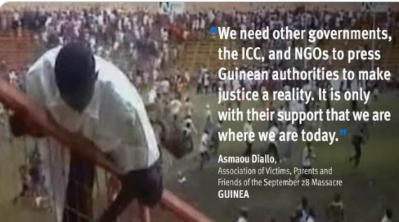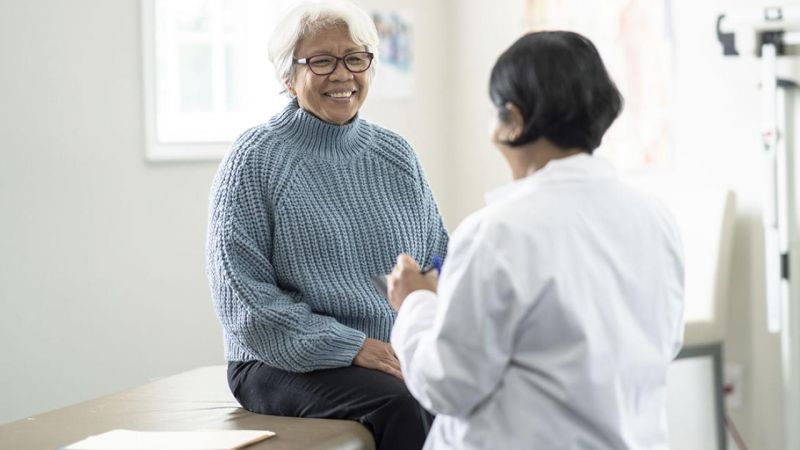Photos: YouTube\Twitter
(Conakry, September 27, 2021) – The trial of suspects in the massacre of more than 150 people and the rape of dozens of women in a Guinea stadium on 28 September 2009 should begin as soon as possible, six human rights groups said today.
Twelve years later, victims and their families should not have to wait any longer for justice to finally be delivered.
As Guinea embarks on a political transition process after the 5 September 2021 coup, the opening of this trial would send a strong signal that the authorities are willing to put respect for human rights and the fight against impunity at the center of their priorities.
The groups are the Association of Victims, Relatives and Friends of September 28, 2009 (AVIPA), Equal Rights for All (MDT), the Guinean Human Rights Organization (OGDH), the International Federation for Human Rights (FIDH), Amnesty International, and Human Rights Watch.
Although 12 years have gone by, the need for justice remains as strong as ever for the survivors of the massacre and victims’ families. Just one year ago, the six groups had denounced the delays and time wasted in organizing the trial. The wait has become unbearable for the survivors and victims’ families, the groups said, given that the investigation phase concluded in late 2017.
The Guinean government has promised several times to begin the trial as soon as possible, and no later than June 2020. The organizations remain concerned by an evident lack of will to complete preparations for this trial in Guinea.
In recent months, the steering committee overseeing the preparations for the trial, made up of government officials and international partners, had resumed its work and adopted a road map. Construction had progressed at Conakry’s Court of Appeal, where the trial is to take place, and a training session for judges was planned by the French government. However, despite these efforts, no trial date has yet been set.
“It is urgent for the trial to be held and reparations awarded before all the victims die.”
The investigation by Guinean judges began in February 2010. More than 13 suspects were charged, 11 of whom were sent for trial. Among them is Moussa Dadis Camara, the former leader of the National Council for Democracy and Development junta that ruled Guinea in September 2009, who is living in exile in Burkina Faso. Some of the suspects who have been charged held influential positions until the recent coup, including Moussa Tiegboro Camara, who was in charge of fighting drug trafficking and organized crime.
The organizations are closely following Guinea’s period of political transition after the National Committee for Reconciliation and Development (Comité national du rassemblement et du développement, CNRD) took power on 5 September 2021, and reiterated their call for the respect of human rights and fundamental liberties of all Guineans.
As the CNRD leader, Mamady Doumbouya, stated that “justice will be the compass guiding every Guinean citizen,” the fight against impunity should be at the heart of the authorities’ actions, the groups said.
“It is more than urgent for Guinea to put an end to the cycle of impunity that has deeply marked the country’s history for more than 60 years,” the groups said.
“We remind the authorities that international law requires states to provide effective remedies to victims of human rights violations and that any lack of justice or the adoption of an amnesty for serious crimes is incompatible with these requirements.”
“The new authorities should make justice a prerequisite of their actions.”
The International Criminal Court (ICC) opened a preliminary examination of the situation in Guinea in October 2009. Designed as a court of last resort for the most serious crimes, the ICC steps in when national courts are unable or unwilling to investigate and prosecute such cases.
In its latest report, the ICC had expressed its disappointment that “the trial has not yet started and no timeline or action plan for the opening of the trial has been communicated by the Government of Guinea.” The ICC had indicated that “the Guinean authorities must demonstrate, in the coming months, their will and ability to combat impunity and to prevent renewed cycles of violence.”
Guinea’s partners, particularly the Economic Community of West African States (ECOWAS), the African Union, the European Union, the ICC, and the United Nations should pay increased attention to the current situation in the country and strengthen their actions and support, on the one hand, for the September 28 trial to be organized as soon as possible, and on the other, for the new authorities in Guinea to respect human rights.
Background
Shortly before noon on 28 September 2009, several hundred members of Guinea’s security forces opened fire on tens of thousands of people who had gathered peacefully at the 28 September stadium in Conakry for a march against Dadis Camara’s intention to run for president. The security forces also individually or gang raped more than 100 women and sexually assaulted some of them with objects such as batons or bayonets, during or soon after the events. The security forces killed more than 150 people and wounded hundreds of others.
The security forces then organized a cover-up operation, sealing off all the entrances to the stadium and morgues and removing the bodies to bury them in mass graves. Many of the graves have yet to be identified.
After the investigation was completed, in April 2018, the then-justice minister, Cheick Sako, set up a steering committee to organize the trial. It set Conakry’s Court of Appeal as the location
In January 2020, justice minister Mohammed Lamine Fofana announced to the United Nations his government’s “unequivocal” support for opening the trial. Despite his announcement that proceedings would begin in June, following completion of construction on the courtroom facility, the trial did not move forward during this past year.
In June, Mory Doumbouya was appointed justice minister. Minister Doumbouya said that he supported the trial, but that the judiciary was responsible for organizing it.







